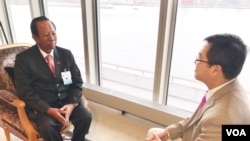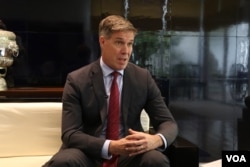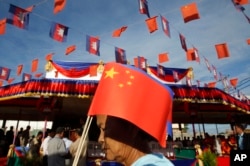Defense Minister Tea Banh has dismissed concerns that a Chinese development project in Koh Kong province could be used for military purposes, and reiterated Cambodia’s commitment to keeping its territory from being used to host a foreign military base.
Banh, who visited the United States last week, said the development project by Chinese-owned Union Development Group (UDG) in Koh Kong was to serve as an eco-tourism and recreation site only.
“Cambodia doesn’t have anything to hide on the Union Development Group,” Banh told VOA Khmer in an exclusive interview in New York on Friday. “It’s a Chinese private company that has received a land concession for tourism development. They’ve planned to invest billions of dollars for the development if the project goes well, which includes an airport and seaport.”
The UDG acquired 45,000 hectares of land, including 20 percent of Cambodia’s coastline, in Botum Sakor and Kiri Sakor districts of Koh Kong province to develop a project that includes hospitals, condominiums, resorts, hotels, factories, an international airport, and a deep sea port. The company has said it will invest $3.8 billion, according to media reports.
Media reports have suggested that the international airport has a 3,400-meter-long airfield, which has raised concerns that it may be used for future military operations. It is scheduled to begin partial operations by the end of 2020.
Banh dismissed any speculation about the possible dual use of the airfield and port, saying he has visited the site several times and it was open to anyone who wanted to see it. The construction of a large airport was in-line with what the government had agreed to as part of the investment plan, he said.
“I can’t say much because such a big airfield can land many types of airplanes. This is normal for an airfield. To say that the Chinese [military] ships and planes will dock there, it is up to the restrictions of a sovereign country.”
Analysts said the deep-water port would be large enough to dock warships and destroyers.
The Cambodian government has nurtured closer relations with Beijing in the last decade, and the US has expressed concerns that China would pressure Cambodia into allowing its territory to be used as a launchpad to project Chinese military power in Southeast Asia.
US Vice President Mike Pence officially raised the concerns in a letter to Prime Minister Hun Sen in November 2018.
US Deputy Assistant Secretary of Defense Joseph Felter also expressed his concerns about a Chinese military presence in Cambodia during his visit in January, citing regional security and possible damage to Cambodia’s sovereignty.
“So we are concerned that this may be the path that China may be leading Cambodia down,” Felter said. “So they may say ‘hey this is just going to be a joint base or this is just going to be a rotational presence or this is just going to be a facility for ships and commercial aircraft.’ We are concerned, based on the precedent across the region, that Cambodia might fall into the same trap other countries have”.
Some US Congressmen are also concerned.
“We are concerned about that as we know they’re building a Chinese naval base in Cambodia, and they are trying to take advantage of the situation to the benefit of China and to the disadvantage of the people of Cambodia,” said Steve Chabot, (R-OH). “So I’m hoping that doesn’t continue.”
China has built a large military base in Djibouti on the east coast of Africa as part of a wider strategy of base-building under its so-called “String of Pearls” strategy in South and Southeast Asia, which includes the Gwadar port in Pakistan, Hambantota port in Sri Lanka and bases in the Pacific Islands. Chinese companies have developed port facilities and airfields, which have minimal economic impacts. Then, according to experts, they also use the facilities to project military power.
“I can assure you that the Cambodian constitution forbids a foreign base in our country and we also don’t send our troops overseas unless it’s at the UN’s request,” said Banh. “Therefore, this is really clear. Clearer than this is that we don’t allow any foreign military unit or troops to be stationed in Cambodia. Our constitution strictly forbids that.”
Analysts say Cambodia has no enemies in the region, thus it does not require the presence of foreign troops on its territory, as it brings more problems for maintaining stability in the region. But China's ambitions may be another story.
“If we look at geopolitics, there are no conditions that require Cambodia to have the presence of foreign troops,” said Chheang Vannarith, president of the Asia Vision Institute. “But if we look at it from the Chinese perspective, China might have some ambition in the region economically, militarily, and security-wise. However, if Cambodia does not allow it or has no need, China cannot force Cambodia to allow foreign troops.”
In early 2017, Cambodia announced the suspension of a joint military drill with the US, citing its busy schedule, but continues to conduct joint exercises with China.
Banh admitted that logistics is also another issue, saying that Cambodia lacks a budget and material resources making it impossible to conduct as many military exercises with any country as it wishes.
“Sometimes, Cambodia doesn’t have the ability and resources, or we have only human resources and will, but lack gasoline, ammunition, and other necessary means,” he said. “Another issue is that sometimes we’re busy with more important tasks and need to move it to another date.”
“Honestly speaking, the People’s Republic of China paid for everything,” he added. “Gasoline, ammunition and other things were brought in and we simply participated and coordinated on locations needed. Therefore, our troops were able to participate… During the exercise, the PRC even paid for food for hundreds of the organizers. With that, we could immediately do it.”







